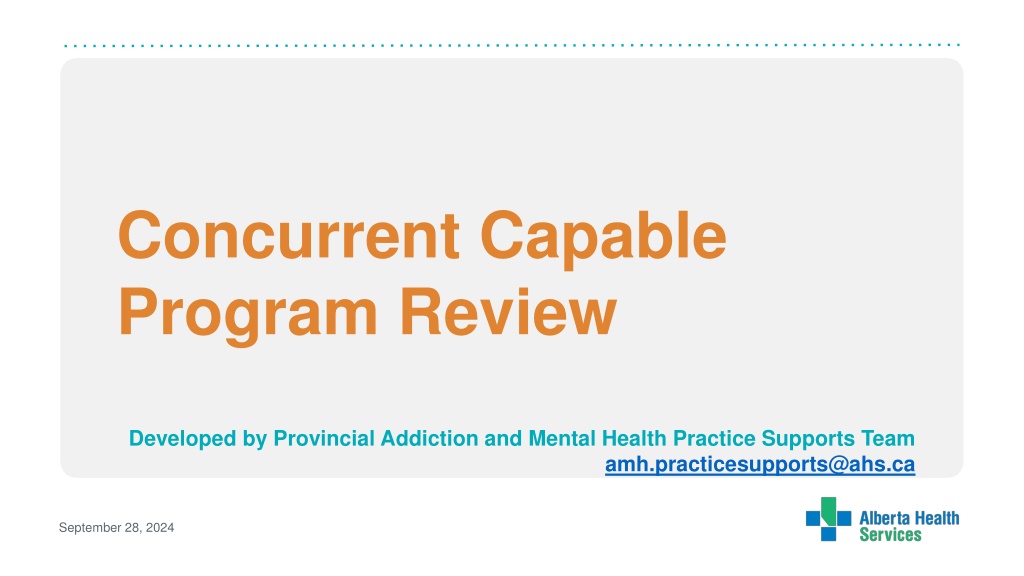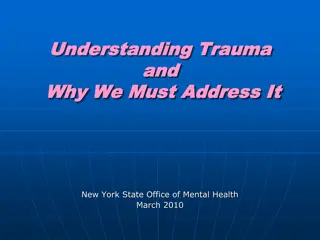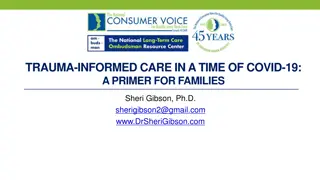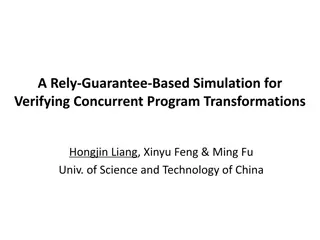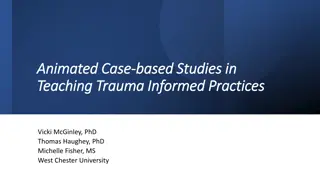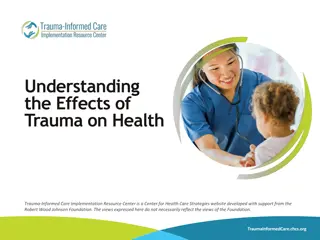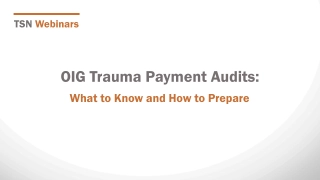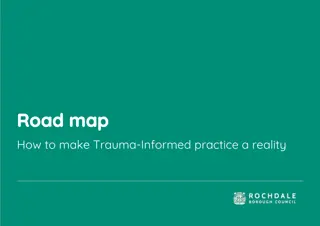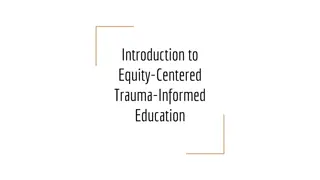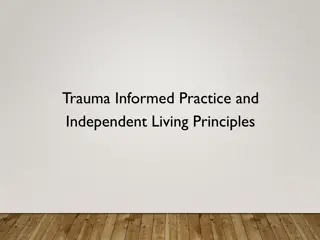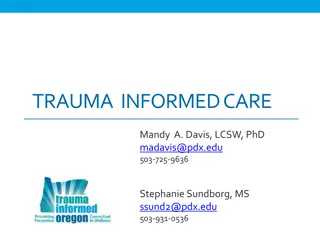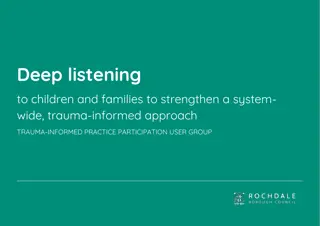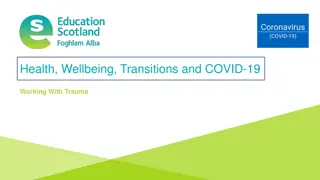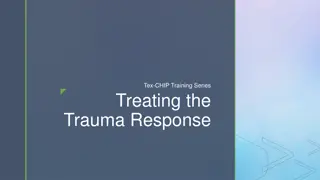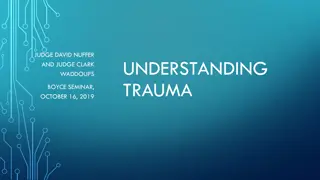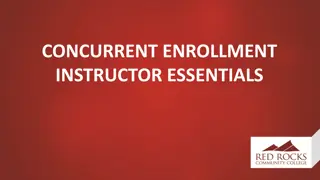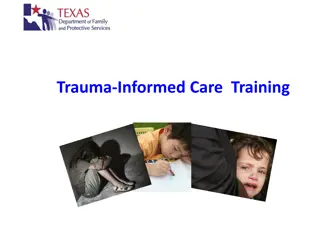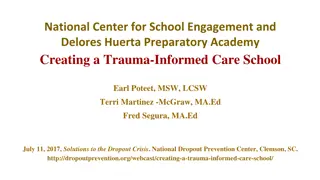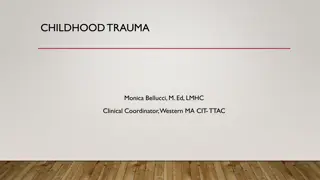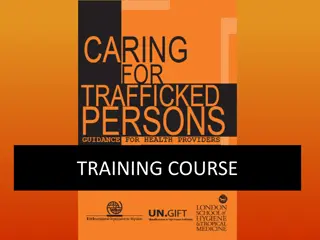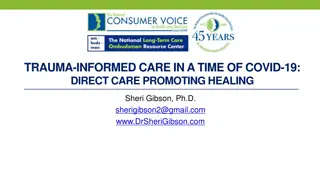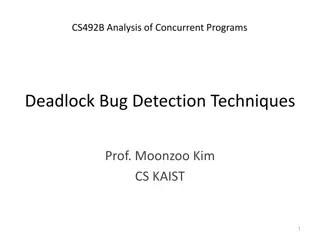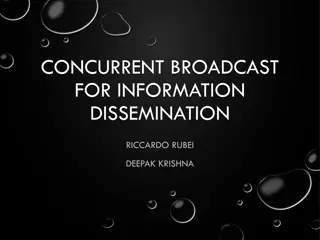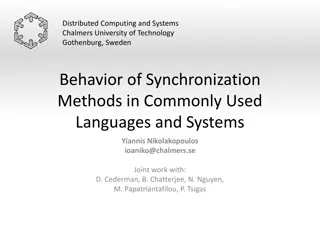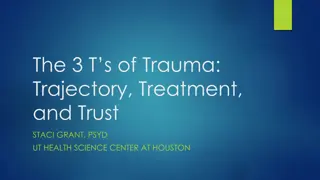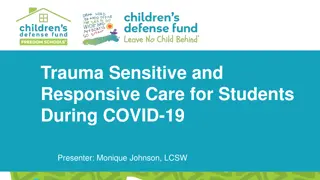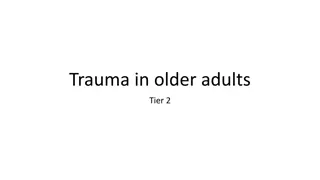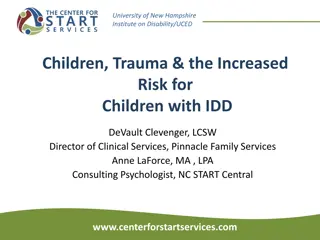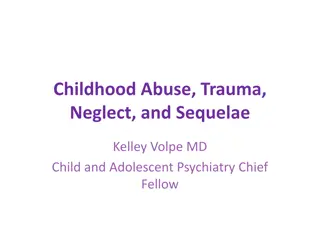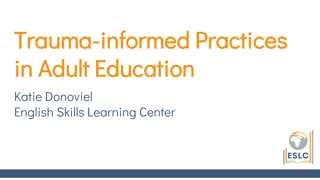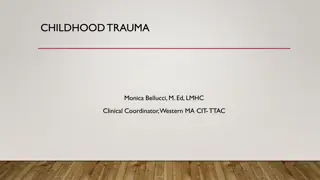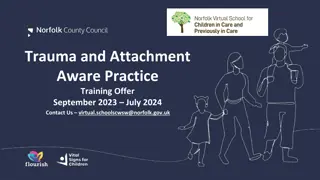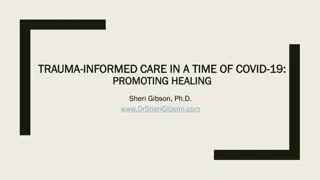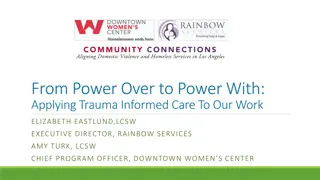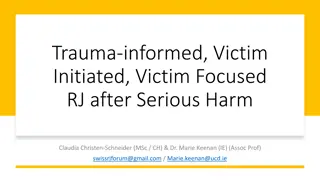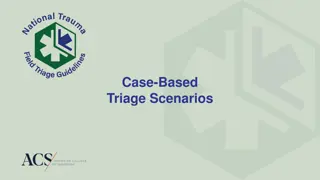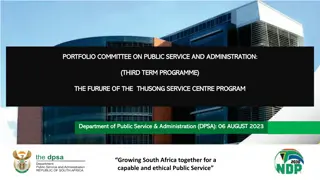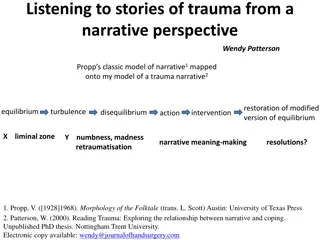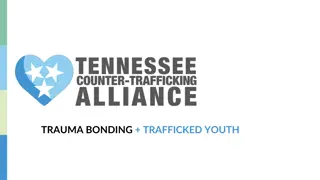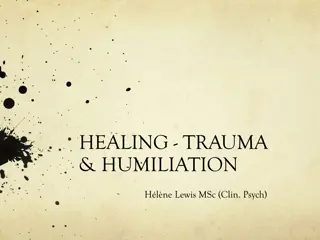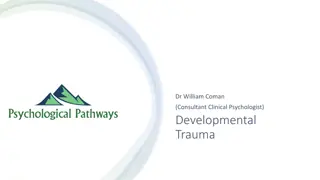Concurrent Capable Program Review: Creating Trauma-Informed Services
In this program review developed by the Provincial Addiction and Mental Health Practice Supports Team, the focus is on creating welcoming, trauma-informed, and recovery-oriented services for individuals and families with concurrent mental health and substance use disorders or behavioral addictions. The review delves into the background, definitions, and goals of the Concurrent Capable Program to ensure integrated care for those in need.
Download Presentation

Please find below an Image/Link to download the presentation.
The content on the website is provided AS IS for your information and personal use only. It may not be sold, licensed, or shared on other websites without obtaining consent from the author. Download presentation by click this link. If you encounter any issues during the download, it is possible that the publisher has removed the file from their server.
E N D
Presentation Transcript
Concurrent Capable Program Review Developed by Provincial Addiction and Mental Health Practice Supports Team amh.practicesupports@ahs.ca September 28, 2024
Concurrent Capable Program Review Welcome! Thanks for taking the time to gather and reflect on our team s program and practice. September 28, 2024
Land Acknowledgement Our work takes place on historical and contemporary Indigenous lands, including the territories of Treaty 6, Treaty 7 & Treaty 8 and the homeland of the M tis Nation of Alberta and 8 Metis Settlements. We also acknowledge the many Indigenous communities that have been forged in urban centres across Alberta. Provincial Addiction Mental Health Practice Supports Team
Concurrent Capable Program Review Background In 2009, Alberta Health Services announced a province-wide system of addiction and mental health services that would respond to the unique needs of three groups of people: those with mental illness or mental disorders those with substance use and/or gambling concerns (behavioural addiction) those with both. AMH healthcare providers requested tools and resources to integrate addiction and mental health services. The Standard Approach to Concurrent Capable Practice Framework was developed to help individuals, their families, and healthcare providers understand what to expect from Addiction and Mental Health Services through standards and key indicators. September 28, 2024
Concurrent Capable Program Review September 28, 2024
Concurrent Capable Program Review The goal: Creating welcoming, trauma-informed, recovery-oriented, and concurrent capable services for individuals and families experiencing mental health and substance use disorder or behavioural addiction. September 28, 2024
Concurrent Capable Program Review Definitions Concurrent Disorders describe a situation where a person is experiencing a mental health and substance use disorder or behavioural addiction at the same time. Concurrent Capability means providing welcoming, trauma-informed, recovery- oriented care within our healthcare services for people experiencing concurrent or co-occurring disorders. September 28, 2024
Concurrent Capable Program Review Two Activities for the CCPR Review Session (3 hours): where the group meets to score each section, which can include robust discussion. The entire content can be completed in a half day or 2-3 hours. Recommendations Session (1 hour): where the group regathers to hear a summary of the review scores and suggested recommendations. This session includes time for team input and brainstorming on quality improvement initiatives that are proposed and planned and takes about one hour. September 28, 2024
Concurrent Capable Program Review Roles and Responsibilities for CCPR Facilitator Prepares materials for a virtual or in-person session Allows conversation to happen when reaching a consensus on each item to score Guides participants through review sections and discussion Scribe Uses scorebook to record scores for each item and capture discussions Participants Participates in scoring, reading sections and collaborative conversations September 28, 2024
Concurrent Capable Program Review Process of Review Choose a scribe to record each section s scores and notes Read each item out loud Have a discussion with your group to reach a consensus on the average score for each section Progress through each section(s) Scribe records scores and summarizes discussion notes Wrap-Up and Next Steps September 28, 2024
Concurrent Capable Program Review Agenda Section by Section scoring 90-120 mins Summary and Wrap-Up 15 mins Introductions 20 mins Set the Stage 20 mins September 28, 2024
Concurrent Capable Program Review The Likert Scale Five-point scale 1 Not at All 2 Slightly 3 Somewhat 4 Mostly 5 Completely Allows each participant to indicate how much they agree or disagree with each statement Can indicate their positive to negative strength of agreement or feeling regarding the statement. September 28, 2024
Concurrent Capable Program Review Review Sections 1. Welcoming and Engaging 2. Standardized Screening 3. Comprehensive Assessment 4. Integrated Recovery Planning 5. Comprehensive Interventions 6. Transitions in Care 7. Program Collaboration and Partnership 8. Concurrent Capable Competency Development September 28, 2024
Concurrent Capable Program Review Welcoming and Engaging Written and online information about accessing services welcomes individuals and families with concurrent disorders into service and offers hope for recovery. Access to services is prompt and offered in a coordinated manner. People are supported through delays they may experience while getting to their preferred services. The program environment (i.e., signage to find the program, reception area, waiting room, hallways, meeting spaces, pictures/posters, brochures, flyers, etc.) creates a welcoming atmosphere that supports engagement and recovery for individuals and families with substance use, gambling, and mental health conditions. People and their family members receive welcoming access to service regardless of their stage of change regarding their mental health, substance use and/or gambling concerns. September 28, 2024
Concurrent Capable Program Review Welcoming and Engaging Access to educational information about recovery and building resilience, substance use and/or gambling and mental health conditions is available. Healthcare providers introduce themselves, explain their role, consent for treatment, the limits of confidentiality, how to include family and other support persons in the recovery planning process and the process of filing a complaint if there are concerns about how a person is treated while accessing services or the kind of services they received. Healthcare providers actively listen to people seeking services, answer their questions, and collaboratively explore which resources will work best for them, considering their stage of change, cultural beliefs, and lifestyle. September 28, 2024
Concurrent Capable Program Review Standardized Screening and Brief Intervention In a welcoming and respectful manner, standardized screening tools are used to screen everyone seeking services for concurrent substance use, gambling, mental health conditions (including trauma), medical conditions, and areas with increased health or well- being risks. This information is used to inform recovery planning. People seeking services feel engaged in the screening process, understand the purpose of the questions, and how their answers help connect them to the most appropriate service(s). September 28, 2024
Concurrent Capable Program Review Comprehensive Assessment Initial assessments gather and document information about each concurrent substance use, gambling and/or mental health condition, active or stable. Assessment is an ongoing process in which information is gathered and reviewed regularly to understand people s evolving concerns and goals. Assessments focus on people s current strengths, skills, supports and periods of well-being to provide a positive, recovery-focused approach to recovery planning. September 28, 2024
Concurrent Capable Program Review Comprehensive Assessment Assessments regularly gather and document information about the stage of change (i.e., precontemplation, contemplation, preparation, action, maintenance, return to use) people are in regarding each condition for which they receive services. With consent, healthcare information may be shared with the care team and/or family members to support people s recovery. September 28, 2024
Concurrent Capable Program Review Integrated Recovery Planning People s hopeful goals, personal needs, recent successes, and strengths are included in their recovery plan. For each concern, a stage of change is identified, stage-matched interventions are explored, and achievable steps to help the person feel and be successful are agreed to. Person-centred plans focus on building skills and support. When required, the plan is modified and positive feedback for small steps of progress in the recovery journey is used. People are active participants in care. They know their rights and responsibilities, and their preferences and goals in their recovery journey are respected. Family members may be included. September 28, 2024
Concurrent Capable Program Review Integrated Recovery Planning When exploring potential resources to support recovery, the risks and benefits of each alternative are explained. Recovery plans include biopsychosocial and spiritual goals to ensure people feel empowered to meet their basic needs and address substance use and/or gambling and/or mental health concerns. When possible, a copy of the recovery plan is provided to people and/or family members and others in the care team. September 28, 2024
Concurrent Capable Program Review Comprehensive Interventions Education and resources about mental health, substance use, gambling, concurrent disorders, recovery and building resilience are available and accessible (i.e., placement for pick up, various languages based on community demographics). Stage-matched group or individual sessions provide psychoeducation to empower choice and decision-making. People feel involved in implementing their recovery plan. They learn skills, practice good self-care, and have the necessary information about connecting with mutual support groups and community resources to improve their quality of life and maintain well-being. September 28, 2024
Concurrent Capable Program Review Comprehensive Interventions Family members understand how to access community support and resources that promote their well-being and recovery. Healthcare providers provide strengths-based, recovery-oriented, trauma-informed services for people who continue to use substances, do not take medication as prescribed, or are not following other aspects of their recovery plans. Negative consequences or punishment are not used. The program responds positively when individuals ask for help when they are having difficulty maintaining their recovery or beginning to experience increased symptoms of mental health conditions. September 28, 2024
Concurrent Capable Program Review Transitions in Care Transition plans, procedures, practices, and forms identify specific stage-matched recommendations for each issue the person seeks treatment for. For each transition in care, people are included in warm handoff communication between the sending and receiving healthcare providers, whether in person or by phone. A multidisciplinary team of healthcare providers works collaboratively to coordinate care, provide care and help people make transitions to ensure suitable supports are in place to help them achieve their recovery goals at all stages. With consent, information regarding care and progress may be shared with other care team members. September 28, 2024
Concurrent Capable Program Review Transitions in Care People often have multiple priorities, so services are coordinated to match their goals for recovery. Healthcare providers help people navigate the health and social services support systems to ensure they become connected with community services they need (i.e., housing, food security, showers, finance, legal, education, dental, optometry). A written list of community resources and contact information is provided. People, family members and the larger care team know how to re-engage with services when needed. The program invites people and family members to provide feedback on their service experience to foster continued program development and improvement. September 28, 2024
Concurrent Capable Program Review Program Collaboration & Partnership The program is connected to and collaborates with local partner agencies offering community-based health and social services. Addiction or mental health staff promptly consult a collaborative program partner when requested. Healthcare providers participate in scheduled addiction and mental health services interagency care coordination meetings to address the complex needs of people and their families. September 28, 2024
Concurrent Capable Program Review Concurrent Capable Competency Development Specific recovery-oriented concurrent disorder competencies for all staff are included in position descriptions. The program has and implements its written scope of practice for concurrent disorder competency for all healthcare providers based on their position within the program and professional designation, if any. This may be done through local procedures, supervision, group and individual learning activities) for all staff working in and leading the program. Administrative and clinical supervisors use their knowledge and skills to help staff become more welcoming, recovery-oriented, and concurrent capable. September 28, 2024
Concurrent Capable Program Review Next Steps Team Priorities Quick Wins September 28, 2024
Recommendations Session Developed by Provincial Addiction and Mental Health Practice Supports Team amh.practicesupports@ahs.ca September 28, 2024
Preparing for the Recommendations Session September 28, 2024
Concurrent Capable Program Review Recommendations Session Meet again with your participants in one month Review how each section scored and summary of comments Present the recommendations list Brainstorm quality improvement actions September 28, 2024
Concurrent Capable Review Program Recommendations Session Agenda 1. Welcome to participants Handout summary of scores and recommendations 2. Review each section's recommendations 3. Highlight team strengths and team opportunities 4. Follow-up meeting in 3-6 months to review planned improvements September 28, 2024
Want to collaborate or have questions? Contact amh.practicesupports@ahs.ca September 28, 2024
